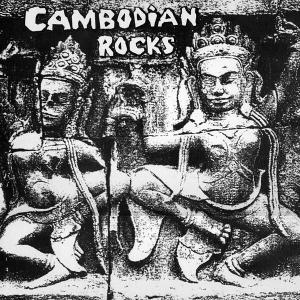Rock most often refers to:

Sedimentary rocks are types of rock that are formed by the deposition and subsequent cementation of mineral or organic particles on the floor of oceans or other bodies of water at the Earth's surface. Sedimentation is the collective name for processes that cause these particles to settle in place. The particles that form a sedimentary rock are called sediment, and may be composed of geological detritus (minerals) or biological detritus. Before being deposited, the geological detritus was formed by weathering and erosion from the source area, and then transported to the place of deposition by water, wind, ice, mass movement or glaciers, which are called agents of denudation. Biological detritus was formed by bodies and parts of dead aquatic organisms, as well as their fecal mass, suspended in water and slowly piling up on the floor of water bodies. Sedimentation may also occur as dissolved minerals precipitate from water solution.

Metamorphic rocks arise from the transformation of existing rock types, in a process called metamorphism, which means "change in form". The original rock (protolith) is subjected to heat and pressure, causing profound physical or chemical change. The protolith may be a sedimentary, igneous, or existing metamorphic rock.

Weathering is the breaking down of rocks, soil, and minerals as well as wood and artificial materials through contact with the Earth's atmosphere, water, and biological organisms. Weathering occurs in situ, that is, in the same place, with little or no movement, and thus should not be confused with erosion, which involves the movement of rocks and minerals by agents such as water, ice, snow, wind, waves and gravity and then being transported and deposited in other locations.

Rocks is the fourth studio album by American rock band Aerosmith, released May 3, 1976. AllMusic described Rocks as having "captured Aerosmith at their most raw and rocking." Rocks was ranked No. 176 on Rolling Stone's list of the 500 Greatest Albums of All Time. It has greatly influenced many hard rock and heavy metal artists, including Guns N' Roses, Metallica, and Nirvana. The album was a commercial success, charting three singles on the Billboard Hot 100, two of which reached the Top 40. The album was one of the first to ship platinum when it was released, and has since gone quadruple platinum.
Krautrock is a broad genre of experimental rock that developed in Germany in the late 1960s among bands drawing on diverse sources such as psychedelic rock, the avant-garde, electronic music, funk, minimalism, jazz improvisation, and world music styles. The term "krautrock" was coined by English-speaking music journalists in the early 1970s as a humorous umbrella label for the varied German scene. Largely divorced from the traditional blues and rock and roll influences of British and American rock music up to that time, the period contributed to the evolution of electronic and ambient music as well as the birth of post-punk, alternative rock and new-age music.

Durdle Door is a natural limestone arch on the Jurassic Coast near Lulworth in Dorset, England.

Red Rocks Amphitheatre is a rock structure near Morrison, Colorado, 10 miles (16 km) west of Denver, where concerts are given in the open-air amphitheatre. There is a large, tilted, disc-shaped rock behind the stage, a huge vertical rock angled outwards from stage right, several large outcrops angled outwards from stage left and a seating area for up to 9,525 people in between. At its height, the amphitheatre sits at 6,450 feet (1,970 m) above sea level, and the surrounding Red Rocks Park covers 868 acres. The amphitheater is owned and operated by the City and County of Denver, Colorado and is located in Red Rocks Park, part of the Denver Mountain Parks.
Lounge music is a type of easy listening music popular in the 1950s and 1960s. It may be meant to evoke in the listeners the feeling of being in a place, usually with a tranquil theme, such as a jungle, an island paradise or outer space. The range of lounge music encompasses beautiful music–influenced instrumentals, modern electronica, while remaining thematically focused on its retro-space-age cultural elements. The earliest type of lounge music appeared during the 1920s and 1930s, and was known as light music. In the 21st century, the term lounge music may also be used to describe the types of music played in hotels, casinos, supermarkets, several restaurants, and piano bars.
A greatest hits album, sometimes called a "best of" album or a catalog album, is a compilation of songs by a particular artist or band. Most often the track list contains previously released recordings with a high degree of notability. However, to increase the appeal, especially to people who already own the original release, it is common to include remixes or alternate takes of popular songs; sometimes even new material will function as bonus tracks. At times, a greatest hits compilation is the original album release for songs that have themselves been released as a single and charted successfully.

Hot Space is the tenth studio album by the British rock band Queen. It was released on 21 May 1982 by EMI Records in the UK and by Elektra Records in the US. Marking a notable shift in direction from their earlier work, they employed many elements of disco, funk, rhythm and blues, dance and pop music on the album. This made the album less popular with fans who preferred the traditional rock style they had come to associate with the band. Queen's decision to record a dance-oriented album germinated with the massive success in the US of their 1980 hit "Another One Bites the Dust".

Intrusive rock is formed when magma crystallizes and solidifies underground to form intrusions, for example plutons, batholiths, dikes, sills, laccoliths, and volcanic necks.
A punk house is a dwelling occupied by members of the punk subculture. Punk houses are similar to the hippie crash pads of the 1960s and the slan shacks of science fiction fandom. The Factory, an alternative living space founded by Andy Warhol as the home base of The Velvet Underground, is directly linked to the formation of punk rock in New York City. In the early 1980s, a few punk gangs developed around allegiance to certain punk houses.

Clastic rocks are composed of fragments, or clasts, of pre-existing minerals and rock. A clast is a fragment of geological detritus, chunks and smaller grains of rock broken off other rocks by physical weathering. Geologists use the term clastic with reference to sedimentary rocks as well as to particles in sediment transport whether in suspension or as bed load, and in sediment deposits.

"Dandelion" is a song by the English rock band the Rolling Stones, written by Mick Jagger and Keith Richards, and first released as a B-side to "We Love You" in August 1967. With lyrical references to British counting or nursery rhymes, it reached number eight on the UK Singles Chart and number 14 on the US Billboard 100 singles chart.

John Richard Deacon is an English retired musician, best known for being the bass guitarist for the rock band Queen. He composed several songs for the group—including Top 10 hits "You're My Best Friend", "Another One Bites the Dust", "Back Chat", and "I Want to Break Free"—and was involved in the band's financial management.

The Cool Kids is an American alternative hip hop duo composed of rappers Antoine "Sir Michael Rocks" Reed and Evan "Chuck Inglish" Ingersoll. The Cool Kids' music had been released primarily to the independent Chocolate Industries via their own label C.A.K.E. Recordings, but as of 2010 are no longer with Chocolate Industries. Reed and Ingersoll have made appearances in numerous forms of media, as well as in collaborations with other artists such as Chip tha Ripper, Asher Roth, Yelawolf, Kenna, Ivan Ives, The Bloody Beetroots, Drake, Travis Barker, Lil Wayne, Pac Div, Ludacris, Mac Miller, Maroon 5, Curren$y, and The O'My's. Cool Kids are also members of the hip-hop collective All City Chess Club founded in 2010.
Chrisavgi (Kristi) Stassinopoulou is a Greek singer, lyricist, and fiction writer. A native Athenian, she is an internationally known artist of the world music circuit. She is accompanied by composer, arranger, co-producer and multi-instrumentalist Stathis Kalyviotis. Their music combines traditional Greek rhythms and sounds, Byzantine vocal lines, rebetiko music, psychedelic rock, ambience and electronica.

"Dance Little Sister" is a song written by Mick Jagger and Keith Richards that was first released on the Rolling Stones 1974 album It's Only Rock 'n Roll. It was also released as the B-side of the Rolling Stones single "Ain't Too Proud to Beg" and on several of their compilation albums.

Cambodian Rocks is a compilation of 22 uncredited, untitled Cambodian psychedelic and garage rock songs from the late 1960s and early 1970s. When the tracks were recorded, musicians in the thriving music scene were combining Western rock and pop genres with their own styles and techniques. When the Khmer Rouge came to power in 1975, artists were among those viewed as a threat to the regime's agrarian socialist vision, and several of the performers on the album are believed to have been among those killed during the ensuing Cambodian Genocide of 1975-1979. A great deal of information about them and their creative output was lost, although some has been recovered since the album's release.













